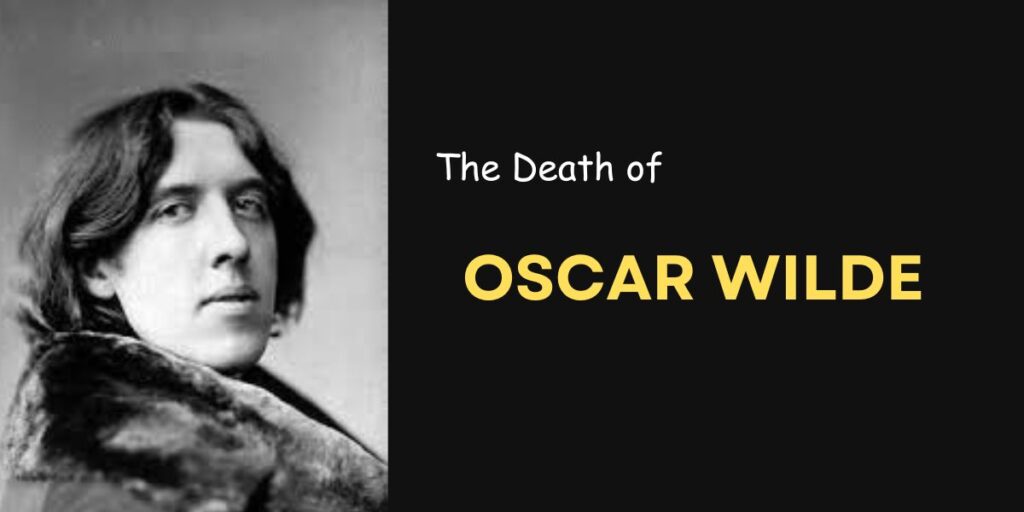How Did Oscar Wilde Die
Introduction:
Oscar Wilde was a famous literary figure whose wit, charm and unparalleled talent left an indelible impression on literature and society. Born in 1854, Wilde is best known for his plays, essays, and the classic novel The Picture of Dorian Gray, which demonstrate his sharp wit and deep insight into human nature. His works often challenged Victorian social norms and embraced themes of aesthetics and personal freedom, making him famous and controversial. Understanding the life and death of Oscar Wilde is essential not only to appreciate the tragedy of a brilliant mind constrained by the strict moral codes of his time, but also to understand how his experiences shaped his legacy. Her death, caused by imprisonment, labor, and an untimely death, illustrates the societal pressures faced by individuals who transgressed traditional boundaries.

The Life and Achievements of Oscar Wilde
Oscar Wilde’s career as a writer, poet and playwright made him one of the most fascinating literary figures of the 19th century. Known for his mastery of language and razor-sharp wit, Wilde’s body of work includes a diverse range of plays, essays, and stories celebrated for their humor, social criticism, and deep themes. Among his most notable works are The Picture of Dorian Gray, a novel that explores the dark depths of vanity and moral decay, and the play The Importance of Being Earnest, a comic masterpiece about social norms and pretense. Absurdities are highlighted. Wilde’s influence extends far beyond his time, as he challenged the rigid conventions of Victorian society and paved the way for future literary movements that embraced individualism, satire, and artistic freedom. Their contributions helped shape modern literature by embracing bold ideas and a fearless approach to both life and art.
The events that lead to his downfall
Oscar Wilde’s downfall was rooted in his defiance of the strict moral code of Victorian England, a society notorious for its conservative and repressive values. Known for his extravagant lifestyle and open embrace of aesthetics, Wilde’s personal life was as unconventional as his works. A major factor leading to her public notoriety was her passionate and tumultuous relationship with a young poet, Lord Alfred Douglas. This association drew the ire of Douglas’s father, the Marquess of Queensberry, who sought to expose and humiliate Wilde. In response to Marquise’s accusations, Wilde unwisely filed a libel suit, a move that backfired when evidence of her private life emerged during the trial.
Revelations from the obscenity trial led to Wilde’s arrest and trial for “gross indecency”, a charge relating to homosexual acts, which was criminalized in England at the time. The trial, sparked by sensationalism and public scrutiny, ended with Wilde’s conviction in 1895. Sentenced to two years of hard labour, this period marked the beginning of a significant decline in his health and social standing, overshadowing his once brilliant career. And he effectively ended the public and personal life he had built.
Imprisonment and its effects on health
Oscar Wilde’s imprisonment was marked by harsh conditions that had a profound effect on both his physical and mental health. Sentenced to two years of hard labor at Reading Gaol, Wilde endured harsh treatment that included long periods of manual labor, poor nutrition, and almost complete isolation. The imprisonment and unforgiving conditions quickly weakened his body, leading to a rapid decline in his overall health. Reports from his time in prison indicated that he suffered from ailments such as weight loss, chronic fatigue, and untreated injuries, which added to his weakened condition.
The number of incarcerations increased from physical; Wilde’s spirit, once defined by his lively wit and intellectual fervor, was deeply affected. When he was released in 1897, Wilde was a shadow of his former self, bearing the psychological scars of humiliation and social rejection. He spent his remaining years in poverty and exile in France, cut off from the literary world that had once celebrated him. His mental and emotional struggles were evident in his later works, such as The Ballad of Reading Gaol, which revealed his painful experiences and his deep sadness. The harsh consequences of his imprisonment ultimately hastened his death and emphasized the price he paid for violating Victorian norms.
Circumstances of his death
After his release from prison, Oscar Wilde’s health continued to deteriorate, largely due to the physical and emotional toll of his imprisonment and the resulting impoverished lifestyle. The lack of adequate medical care, combined with the pressures of exile and financial instability, led to his steady decline. Wilde settled in Paris, where he lived in relative obscurity, relying on the generosity of friends and admirers while suffering from deteriorating health and constant loneliness.
The disease that ultimately led to Wilde’s death was cerebral meningitis, believed to have been caused by an untreated ear infection that worsened over time. By the end of November 1900, Wilde’s condition was critical. His friends, including the devout Robert Ross, stayed with him in his final days. Even in his weakened state, Wilde maintained moments of humor and wit, witnesses said. One of his most famous final comments, “My wallpaper and I are fighting to the death. One of us has to go,” captured the essence of his character—sharp irony and A combination of disrespect.
Wilde’s Last Words and Legacy
Oscar Wilde‘s last words are as legendary as the man himself, reflecting the humor, irreverence and sharp wit that defined his personality. His famous last words, “My wallpaper and I are fighting to the death. One of us has to go,” encapsulate his ability to find humor in even the darkest moments, a testament to his resilient spirit. is This ironic remark is a sign of irreverence towards the hardships of Wilde’s life and his enduring wit, even as he lay on his deathbed.
Wilde’s death initially reinforced the scandalous reputation that plagued his later years. However, over time, public perception changed, and Wilde came to be seen as a martyr for individualism and artistic freedom in the face of social oppression. The unfair treatment she received, particularly her imprisonment because of her sexuality, highlighted the strict moral codes of Victorian society and the personal sacrifices she made to live an authentic life. . This realization led to a renewed interest in his life, developing him not only as a literary giant but as a symbol of courage and resistance to conformity.
Today, Wilde’s life story influences modern ideas on literature, freedom, and identity. He is celebrated as an early advocate of living truthfully, regardless of social constraints. Her experiences resonate particularly with those who value freedom of expression and the rights of LGBTQ+ individuals, inspiring conversations about the value of non-conformity and the enduring importance of creativity and self-expression. Wilde’s legacy, much like his writing, challenges norms, delights readers, and promotes the value of living life on one’s own terms.
Conclusion
The Life and Death of Oscar Wilde offers a powerful reflection on the resilience of the human spirit and the complex intersection between genius and adversity. Her lasting legacy is a reminder of the cost of challenging social norms and the bravery it takes to be true to yourself. Despite the public humiliation and suffering he endured, Wilde’s works transcended time, captivating readers with his wit, insight, and unflinching exploration of human nature. The lessons from Wilde’s story are profound: his genius was overshadowed by a society unwilling to accept difference, yet his words continue to influence conversations about art, identity and freedom. live
For today’s readers, exploring Wilde’s works with an understanding of the man behind them offers a richer, more important precedent. Experience His humor, social criticism, and eloquent prose take on deeper meaning when viewed through the lens of his personal trials and triumphs. Engaging with his writing, one can appreciate not only the literary skill but also the passion of a man who dared to live an unapologetic life, leaving a legacy that makes us question, laugh. And challenges to live with courage.
MCQs
1- What was the cause of Oscar Wilde’s death?
Oscar Wilde’s death was the result of complications from cerebral meningitis, believed to be caused by an untreated ear infection that worsened over time. The physical and emotional toll of his impoverished life of imprisonment and exile also contributed to his overall ill health, hastening his decline.
2-What were Oscar Wilde’s last words before he died?
Wilde’s famous last words were comically morbid: “My wallpaper and I are fighting to the death. One of us has to go.” This statement reflects his enduring wit and defiance, even as he approached death.
3-What happened to Oscar Wilde’s wife and son?
After Wilde’s imprisonment, his wife, Constance Lloyd, distanced herself from him and changed her surname to Holland to protect her family’s reputation. She moved to Switzerland with her two sons, Cyril and Vivian. Constance died in 1898, a few years after Wilde’s release, of complications from surgery.
4-What happened to Oscar Wilde’s children?
Wilde’s children, Cyril and Vivian Holland, were brought up under a new family name to avoid the stigma associated with their father’s infamy. Cyril later joined the British Army and was killed in action during the First World War in 1915. Vivian survived the war, began a career as a writer and translator, and wrote a memoir about her father titled Son of Oscar Wilde, which offers an insight into Wilde’s legacy. and the effects on their lives.
How did Oscar Wilde die?
Oscar Wilde died of complications from cerebral meningitis on November 30, 1900 in Paris. The illness is believed to have been triggered by an untreated ear infection that he initially sustained while in prison. The harsh conditions of his imprisonment and the stress of his subsequent life of poverty in exile greatly weakened his health. In his final days, Wilde was cared for by friends, including Robert Ross, who remained loyal to him despite his declining circumstances. Wilde’s death at the age of 46 brought to an end a life marked by remarkable literary achievement and deep personal tragedy.
